
Today, we’re diving into an often-asked question: Do I need to use antifreeze in my pool’s plumbing lines during winterization?
Winterizing your pool is the process of preparing your pool for the cold winter months.
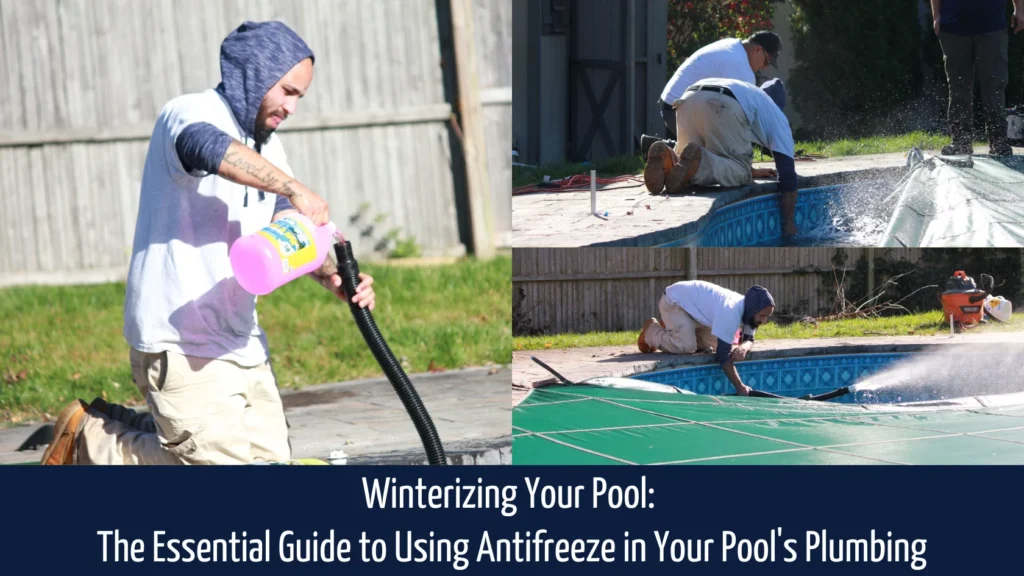
This crucial process ensures that your pool and its various components withstand freezing temperatures and emerge ready for use in spring. If overlooked, you may face various issues, from cracks in the plumbing lines to costly equipment damage – issues that could easily throw a wrench into your summer poolside plans.
Today’s centrepiece of our discussion is the use of antifreeze, a staple of pool winterization.
Just as antifreeze prevents your car’s engine from freezing up, it serves a similar purpose for your pool. It safeguards your pool’s plumbing lines, ensuring they remain intact and functional despite plummeting temperatures.
But is it really necessary? We’ll explore the science, the benefits, and the practicality of using antifreeze in your pool’s plumbing lines to help you make the most informed decision.
So, let’s dive in, shall we?
Pool winterization might sound complex, but it’s a simple concept. It’s preparing your pool for the cold winter months, protecting it from potential damage from freezing temperatures.
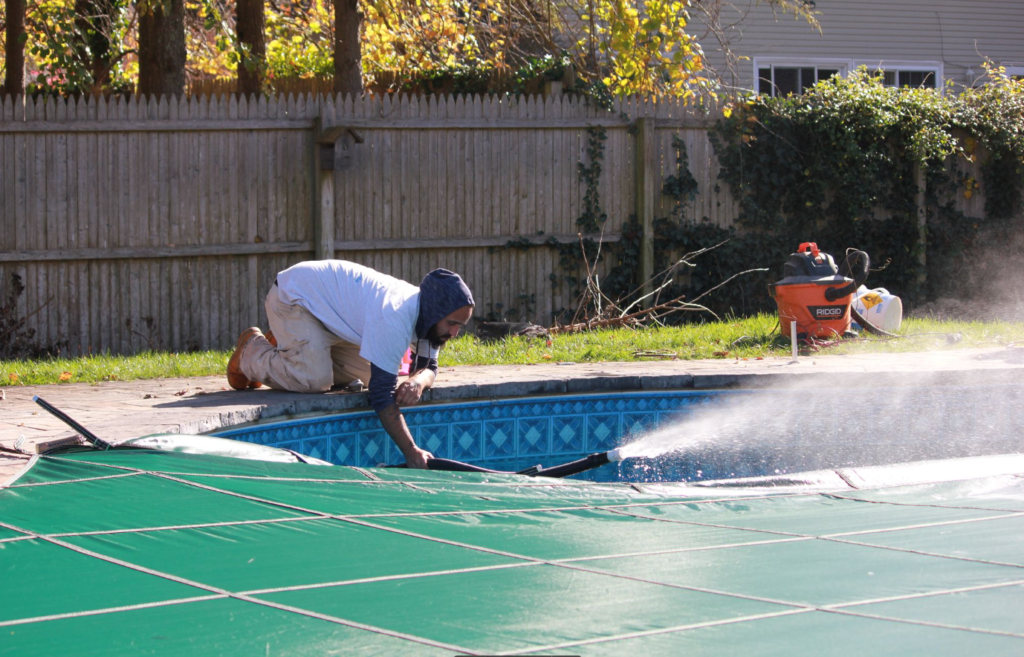
While our winters may invoke images of snowmen and hot chocolate, they aren’t nearly as friendly to our beloved pools. That’s where winterization is a guardian of your pool’s health and longevity.
You might ask, “Why is winterizing my pool so important?”
There are two main reasons: protection and cost savings.
The key point to remember is that water expands as it freezes. Imagine this happening inside your pool’s plumbing lines.
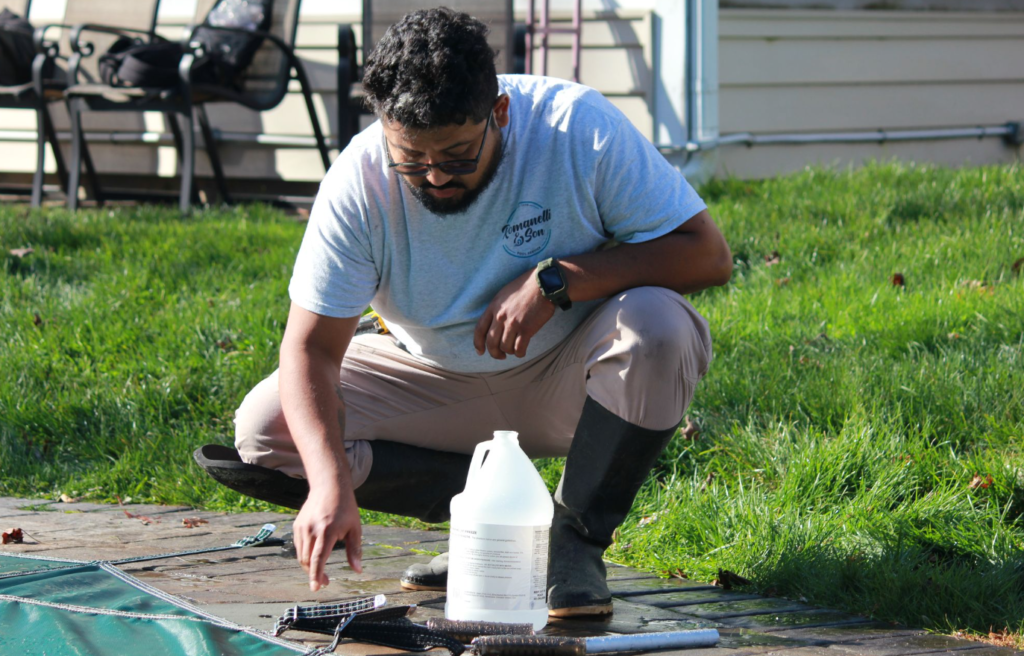
The expansion could lead to cracks, leaks, and severe damage to the plumbing system. You might welcome spring with extensive repair work and hefty bills if the pool isn’t properly winterized.
Not only does winterization protect your pool from physical damage, but it also saves you money in the long run.
While winterizing your pool has a certain cost, it pales compared to the potential repair or replacement costs associated with damage caused by freezing water.
Common issues that may arise from insufficient or incorrect winterization can vary.
At the less severe end of the spectrum, you might notice minor cracks in the plumbing lines.
More serious problems could include major leaks, broken filters, damaged pool heaters, or even a cracked pool shell – issues that demand immediate attention and can be costly to fix.
So, as we navigate the specifics of winterization and explore the role of antifreeze in this process, remember the crucial importance of this preventative measure.
It’s not just about making it through the winter; it’s about ensuring a smooth and joy-filled swimming season when the warmer months roll around again.
Temperature plays a pivotal role in the pool winterization process. While we might enjoy a cold plunge during the hot summer months, the freezing temperatures of winter can be brutal on our pools, especially the plumbing lines.
To understand why, let’s dive into the science of it all.
Water, unlike most substances, expands as it freezes.
This peculiar characteristic can be attributed to the unique structure of water molecules. As the water cools down, the molecules slowly arrange themselves into a hexagonal pattern, taking up more space than when randomly arranged in liquid form.
Hence, frozen water, or ice, is less dense and occupies more volume than its liquid counterpart.
But what does this mean for your pool’s plumbing lines? Imagine water in the lines left untreated as temperatures drop.
As it turns into ice, it expands, putting pressure on the plumbing lines from the inside. This force can be incredibly damaging, leading to cracks, leaks, or in severe cases, even burst pipes.
Plumbing lines are designed to withstand a certain amount of pressure, but the stress caused by expanding ice can easily exceed their tolerance.
The result is often costly repairs and considerable time spent restoring the pool to its operational state.
Understanding this interplay of temperature and water behaviour is fundamental to pool winterization. It underscores the importance of using antifreeze and other winterization methods to ensure the water in your plumbing lines doesn’t freeze, protecting your pool from potential winter damage.
Antifreeze, a term most commonly associated with the automotive world, is also crucial in pool winterization.
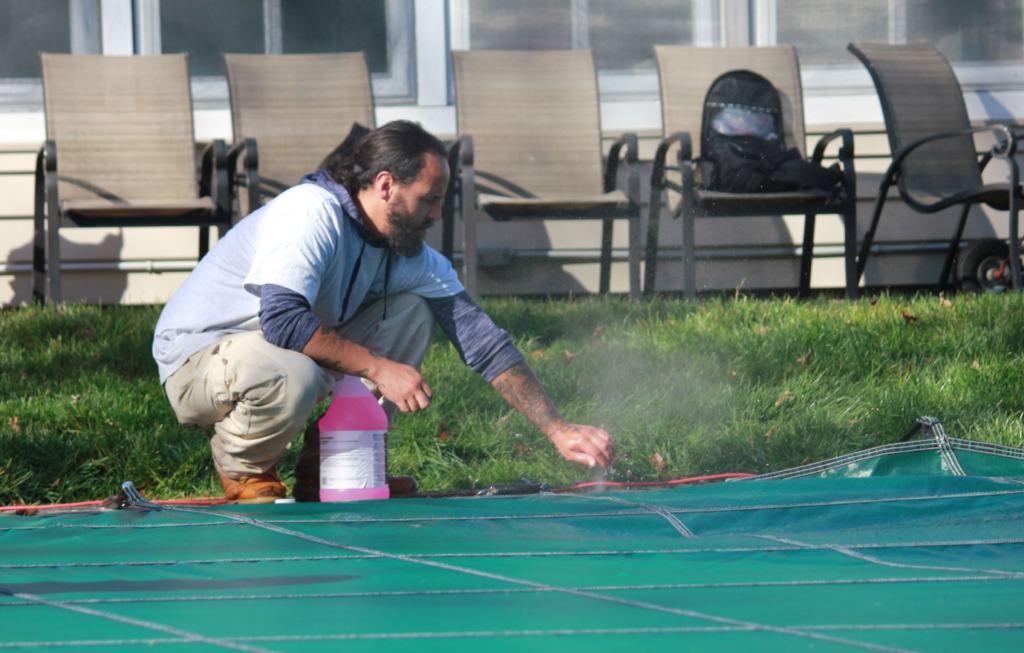
But what exactly is it?
Antifreeze is a liquid substance added to water to lower its freezing point. This is the very characteristic that makes it valuable when the temperatures plummet.
Commonly composed of propylene glycol or ethylene glycol, antifreeze is designed to withstand colder temperatures than water can tolerate without turning into ice.
So, how does antifreeze work? Here’s the straightforward, non-jargon version.
When mixed with water, antifreeze interferes with the water’s ability to form a regular crystalline ice structure – that’s the structure we discussed earlier when discussing why water expands as it freezes.
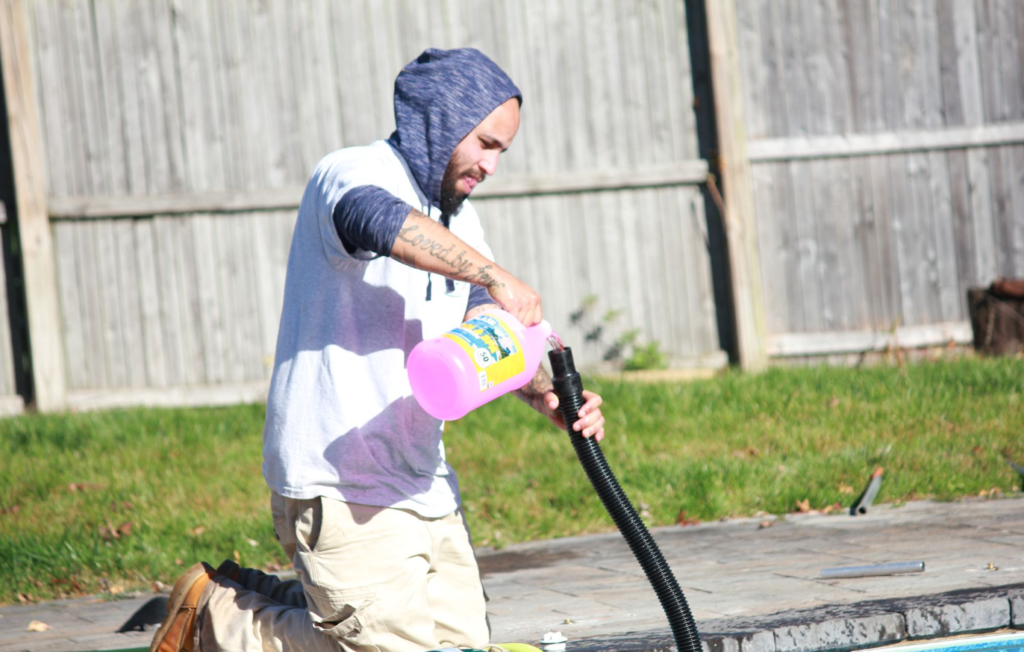
The presence of antifreeze disrupts this pattern, keeping the water from freezing and expanding, even when the temperature dips below the freezing point.
To be clear, antifreeze doesn’t prevent the water from getting cold; it simply stops it from turning into damaging ice.
And that’s exactly what we need to safeguard our pool’s plumbing lines during the frosty winter months.
Now that we have a solid understanding of what antifreeze is and how it works, let’s talk about the different types and which are best suited for your pool.
Primarily, two types of antifreeze are available on the market: Ethylene Glycol and Propylene Glycol.
Ethylene Glycol is more commonly used in automotive applications. It’s highly efficient at lowering the freezing point of water, but it comes with a significant downside – it’s toxic. Consequently, it’s not recommended for use in pools.
On the other hand, Propylene Glycol-based antifreeze is non-toxic and safe for use in pools.
It’s also biodegradable, an added benefit for those conscious of their environmental impact.
While it might be slightly less efficient than its ethylene counterpart, it’s definitely the safer choice, especially considering that pools are a place of fun and leisure, often used by families and pets.
With the type of antifreeze settled, it’s time to discuss safety measures and precautions. Even though Propylene Glycol is non-toxic, handling it with care is still advisable.
Always read and follow the manufacturer’s instructions. If you’re doing the winterization process yourself, remember to wear gloves and safety glasses as a precautionary measure.
Never mix different types or brands of antifreeze, as this could lead to reduced effectiveness or unforeseen chemical reactions.
Store antifreeze in a cool, dry place, out of the reach of children and pets. And while it’s safe for the environment, avoid unnecessary spillage that could lead to slippery conditions.
Remember, whether enjoying your pool in the summer or preparing it for the winter, safety comes first.
As pool service professionals, we cannot stress enough the importance of using antifreeze in your pool’s plumbing lines during winterization.
The absence of this simple preventative measure can result in significant, often costly, damage to your pool.
Let’s imagine a scenario where the antifreeze step is overlooked. The temperatures drop, and the water in your pool’s plumbing lines freezes and subsequently expands.
This can lead to cracks in the pipes, damaged pool equipment, or even a structural failure of the pool shell in extreme cases.
These repairs can put a hefty dent in your pocket, not to mention the time and effort required to restore the pool to a functional state.
Comparatively, the cost of prevention, i.e., the cost of a good quality pool antifreeze, is much more reasonable and manageable.
By investing a little in antifreeze now, you could potentially save a significant amount in future repairs.
But don’t just take my word for it. Let’s hear from some pool owners who have firsthand experience with antifreeze.
One of our clients, Sarah from Bohemia, shared her experience: “I used to think that winterizing the pool was overkill, especially using antifreeze. But after a harsh winter and a burst pipe in the pool’s plumbing lines, I changed my tune. The repair costs were far more than a bottle of antifreeze. Now, I make sure to properly winterize my pool every year.”
Another pool owner, Jack from New York, concurs: “Winterizing and using antifreeze is a must-do for me. It protects my pool and gives me peace of mind during the winter months. Come spring, my pool is ready to go with minimal fuss.”
The consensus is clear: antifreeze in your pool’s plumbing lines is a critical step in winterization. It’s a small investment that can prevent substantial damage and save you considerable time, money, and effort in the long run.
Properly winterizing your pool includes using antifreeze in your pool’s plumbing lines. The process, while straightforward, requires careful attention.

Let’s walk through the steps together, ensuring your pool remains protected during the harshest winter conditions.
Materials Needed:
Step 1: Drain your pool water to below the skimmer level. You can use your pool’s submersible pump for this. If you do not have a submersible pump or a cover pump, you can lower the water with your own system’s to waste or have us lower the water with power vacuuming the pool.
This is to prevent any additional water from getting into your pipes.
Step 2: Switch off the pool heater a day in advance to ensure it’s cool before starting winterization.
Step 3: Remove all the plugs from your pool equipment, including the pump, filter, and heater. This allows any remaining water to drain out.
Step 4: Blow out the lines using a winterizing blower. This step ensures all the water is pushed out of the lines, making room for the antifreeze.
Step 5: Now, it’s time to add the antifreeze. Pour in the antifreeze as per the manufacturer’s instructions. For every 10 feet of pipe, you would need a gallon of antifreeze. Make sure you distribute the antifreeze evenly across all lines.
Step 6: After adding the antifreeze, plug the lines to prevent the antifreeze from coming back into the pool or being diluted with any remaining water.
Step 7: Finally, make sure to clean up and properly dispose of any antifreeze containers, following local waste management guidelines.
Safety Precautions During the Process:
By following these steps carefully and prioritizing safety, you can successfully use antifreeze in your pool’s plumbing lines and prepare your pool for the winter months.
Remember, the time and effort invested now can save you from potential damages and repair costs in the spring.
While using antifreeze is a critical aspect of pool winterization, it isn’t the only measure you should take to protect your pool during the winter months.
Proper pool winterization is a holistic process that includes several steps, each as important as the next.
Balancing Water Chemistry: Before beginning the physical winterization process, it’s important to ensure your pool water is properly balanced. This includes adjusting the pH, alkalinity, and calcium hardness to the recommended levels. Balanced water prevents scale buildup and corrosion and optimizes the effectiveness of other winterizing chemicals.
Thorough Cleaning: A thorough pool cleaning is a must before winterization. This includes brushing the pool walls and floor, vacuuming, and removing any debris. Cleaning reduces the chance of stains and algae growth over the winter months.
Lowering Water Level: Lower the water level to prevent damage from expanding ice. The appropriate level to which you should lower your pool depends on the type of pool cover you have and your geographic location.
Covering the Pool: A winter pool cover or safety cover is essential to keep debris out and protect your pool from the elements. Ensure the cover is tightly secured and properly fitted.
Winterizing Pool Accessories: Don’t forget about your pool accessories. Ladders, rails, and other removable equipment should be removed, cleaned, dried, and stored safely.
Adding Winterizing Chemicals: Along with antifreeze, you might also need to add winterizing chemicals to your pool. These chemicals, including algaecide and shock, help keep your pool water clear and algae-free throughout the winter months.
All these steps are crucial to protect your pool, but they’re also meant to work together.
Balancing your water chemistry enhances the performance of your winterizing chemicals. Cleaning your pool and lowering the water level works hand in hand with your winter cover to keep debris out and minimize ice damage.
And, of course, using antifreeze in conjunction with plugging your lines helps to ensure no damage from frozen water in your pipes.
As you can see, each step complements the other, creating a comprehensive winterization process that optimizes your pool’s protection during the off-season. By taking these preventive measures during pool winterization, you can ensure a smooth and easy pool opening when the warmer months roll around again.
As pool service professionals, we’ve encountered many misconceptions about using antifreeze in pool plumbing.
These misunderstandings can potentially lead to poor winterization practices and damage to your pool. Here, we aim to debunk these myths and clarify your concerns.
Myth 1: “Antifreeze is harmful to the environment”
Many pool owners worry about the environmental impact of using antifreeze. The truth is that the type of antifreeze recommended for pool use, Propylene Glycol-based antifreeze, is non-toxic and biodegradable. This means it’s safe for the environment, and you can use it without worrying about harming your surroundings.
Myth 2: “Antifreeze is toxic and unsafe to use”
While it’s true that some types of antifreeze, such as those used in cars, are toxic, the antifreeze used in pools is quite safe. As mentioned, pool antifreeze is usually Propylene Glycol-based and non-toxic. However, keeping it out of reach from children and pets is still a good idea, and always use safety equipment like gloves and glasses when handling it.
Myth 3: “Using antifreeze in pool lines is unnecessary”
This is a common misconception that can lead to a costly error. If water is left in your pool’s plumbing lines during freezing temperatures, it can expand and cause significant damage to the lines. Antifreeze prevents this by lowering the freezing point of the water, acting as a vital line of defense against the cold.
Myth 4: “All types of antifreeze are the same”
Not all antifreeze products are created equal. While Ethylene Glycol-based antifreeze might be suitable for your car, it’s not ideal for your pool due to its toxicity. Always ensure that you’re using a non-toxic, Propylene Glycol-based antifreeze for your pool.
Myth 5: “You can just use any amount of antifreeze”
Just like any other chemical you use in your pool, the amount of antifreeze should be carefully measured according to your pool size and the manufacturer’s instructions. Overusing can lead to unnecessary costs, and underusing might not provide sufficient protection.
Remember, it’s always best to rely on expert advice rather than myths or misconceptions when it comes to pool maintenance.
Using antifreeze properly and understanding its purpose is a crucial aspect of pool winterization that can save you from unexpected repairs and ensure your pool is ready to dive back into action come spring.
As we’ve explored throughout this post, preparing your pool for winter is not just about protecting your investment—it’s about ensuring that when the warm weather rolls back around, your pool is ready to dive in without a hitch.
Utilizing antifreeze in your pool’s plumbing lines is a crucial step in this process, offering you peace of mind that your pool’s systems are protected against harsh winter temperatures. However, the process can be daunting, especially for first-time pool owners.
This is where we come in. Our professional pool winterization services are designed to take the hassle out of the process. Our team of trained experts understands the importance of thorough and careful winterization, and we bring our knowledge, experience, and dedication to every job.
From adjusting your water chemistry to cleaning, lowering the water level, and carefully applying antifreeze to your plumbing lines, we’ve got you covered.
So, why not let us handle the hard work?
As we’ve explored throughout this post, preparing your pool for winter is not just about protecting your investment—it’s about ensuring that when the warm weather rolls back around, your pool is ready to dive in without a hitch.
Utilizing antifreeze in your pool’s plumbing lines is a crucial step in this process, offering you peace of mind that your pool’s systems are protected against harsh winter temperatures. However, the process can be daunting, especially for first-time pool owners.
This is where we come in. Our professional pool winterization services are designed to take the hassle out of the process. Our team of trained experts understands the importance of thorough and careful winterization, and we bring our knowledge, experience, and dedication to every job.
From adjusting your water chemistry to cleaning, lowering the water level, and carefully applying antifreeze to your plumbing lines, we’ve got you covered.
So, why not let us handle the hard work?

We make pool ownership easy with stress-free maintenance, expert repairs, and cutting-edge tech. From sparkling water to pool automation, we handle every detail so you can relax and enjoy your pool.
© 2025 Paul Romanelli & Son Pool Service.